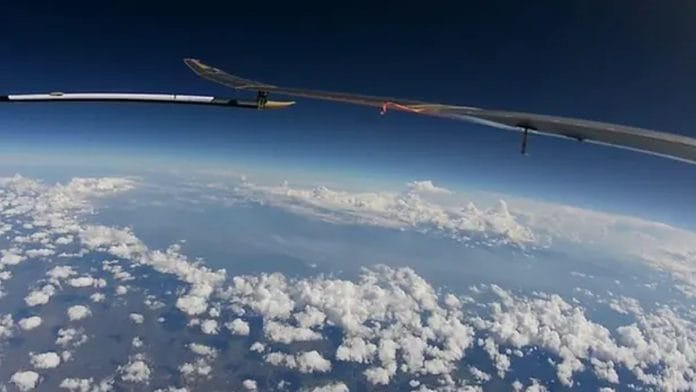New Delhi: UAE-based Mira Aerospace and Indian start-up VEDA Aeronautics have come together to offer High Altitude Pseudo Satellite (HAPS) solutions designed for the Indian market, both in the military and the civilian space.
Sources in the defence and security establishment told ThePrint that the project is being handheld by the Indian military and the HAPS has successfully carried out flights over the Pokhran Test Range at 12 km above the ground. Conducted in March last year, the test marked the only flight of an HAPS in the Indian stratosphere, said sources.
The Indian Air Force (IAF) is looking at acquiring a HAPS solution capable of carrying a minimum 35 kg payload and sustaining operations at an altitude of 18,000 m above sea level for a minimum of 30-45 days.
Running purely on solar power and flying above the clouds at 16-20 km autonomously for months at a stretch, an HAPS platform will fill a capability gap between satellites and HALE (High Altitude Long Endurance) UAVs.
Developed under the Ministry of Defence’s Rs 1,000 crore ‘Make-I project’, which entails 90 percent of government funding, the HAPS would be used for strategic persistent monitoring of India’s borders.
The HAPS UAV is part of a new genre of solar-powered platforms being designed across the world for persistent surveillance, communications, and scientific missions.
Both the IAF and the Navy are on board with the project and are looking to acquire this capability for the short- and long-term.
Sources said the security establishment along with the IAF is closely monitoring the project and handholding the players.
As part of this project, Mira Aerospace — a joint venture of Bayanat and UAVOS — and VEDA Aeronautics announced a collaboration to deliver the world’s most advanced HAPS solutions designed for the Indian market.
“Under this agreement, the companies have committed to deliver a HAPS platform specific to the Indian market within the first half of 2024. Mira Aerospace and VEDA Aeronautics previously performed test flights in the Indian airspace, where the technology demonstrator HAPS unit flew in the Indian stratosphere. This test continues to be the only such flight in India to date,” said a press statement by Mira Aerospace Thursday.
VEDA Aeronautics, a winner of the IAF’s ‘Mehar Baba’ swarm drone competition, had last year secured a Rs 300-crore project from the force to deliver a jet-powered swarm drone system for punitive strikes.
Incidentally, the National Aerospace Laboratories (NAL), established by the government’s Council of Scientific and Industrial Research (CSIR) is also working on a similar project but that could take time given the involvement of multiple facets of technology in this project.
As reported by ThePrint earlier, Bengaluru-based NewSpace Research and Technologies Pvt Ltd (NRT) is also working on HAPS, and in December last year carried out its first flight lasting over 21 hours.
The project is being spearheaded under the Innovation for Defence Excellence (iDEX) initiative of the defence ministry. Under this, NRT has signed a contract for an initial proof of concept demonstration, which targets a solar-powered flight lasting longer than 48 hours.
Sources explained that there are multiple dynamics that come into play when it comes to flying at an altitude of above 10,000 m.
“Stratosphere brings in multiple dynamics. The battery is under too much of a pressure along with the frame itself. There are multiple complications which arise and hence the Veda HAPS managing to fly in the stratosphere is important. Now the plan is for them to bring forward the phase-2 product which will fly for a longer duration,” said one source.
(Edited by Amrtansh Arora)
Also Read: Saab begins construction of Carl Gustaf facility in Haryana via India’s first 100% FDI in defence






